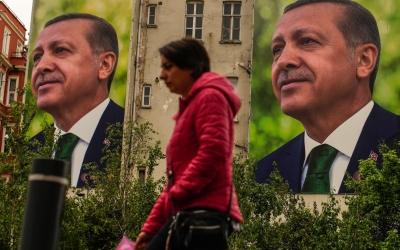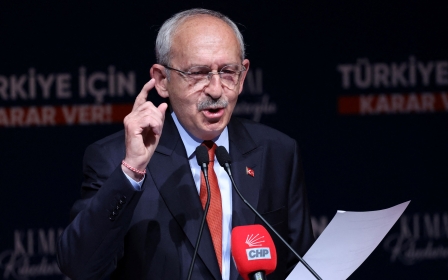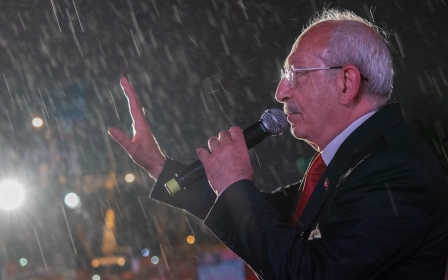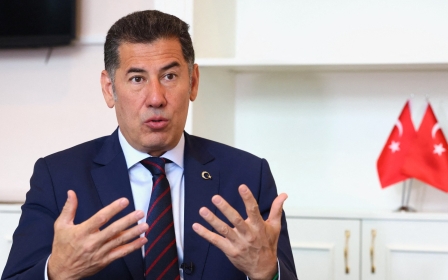Turkey elections: Kilicdaroglu finally has a plan for the run-off and its main theme is fear
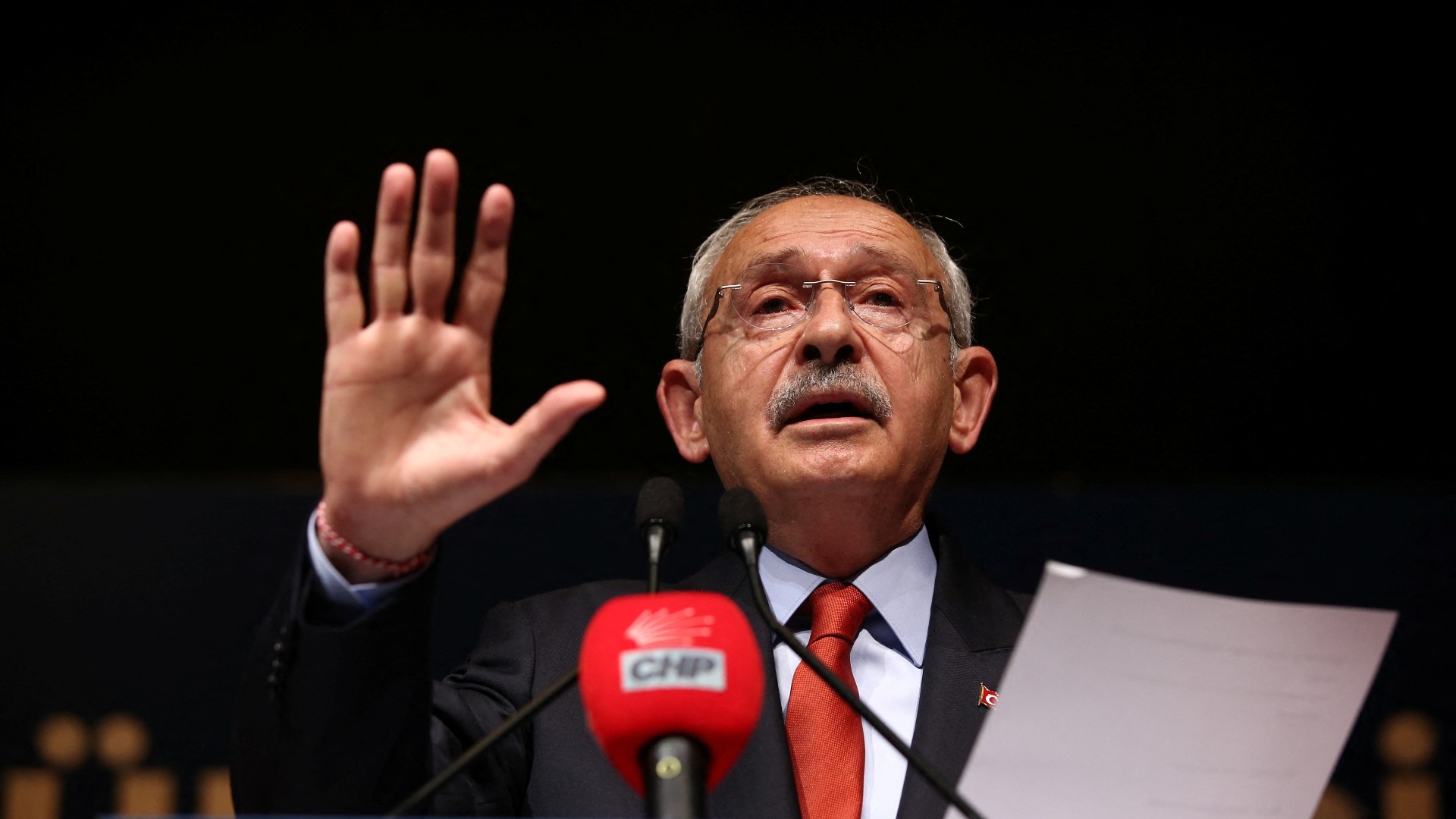
It took four days for Turkish presidential candidate Kemal Kilicdaroglu to emerge following his first-round election defeat on Sunday.
Kilicdaroglu addressed a conference hall full of party supporters with energetic but divisive rhetoric.
He called on everyone in Turkey to make a choice between a government led by President Recep Tayyip Erdogan, which he said would bring “10 million more refugees”, and himself, promising to protect Turkish borders and send all refugees back.
“This campaign will be tense, polarising, and more nationalist,” one Turkish opposition official from Kilicdaroglu’s Republican People’s Party (CHP) told Middle East Eye.
“This a simple choice between Kilicdaroglu or Erdogan. And our main theme is fear, we will remind everyone what the next five years will be like if he is re-elected.”
New MEE newsletter: Jerusalem Dispatch
Sign up to get the latest insights and analysis on Israel-Palestine, alongside Turkey Unpacked and other MEE newsletters
Kilicdaroglu’s speech included language that could be considered ultranationalist. He promised to fight against terrorism to the fullest extent and warned the country of the alleged threat of refugees, which, he claimed, “could become a crime machine” if the Turkish lira continues to depreciate under Erdogan’s rule.
But whatever the content, it is interesting that it took four full days for Kilicdaroglu’s team to table a strategy for the run-off. They seemed to have nothing prepared.
The opposition had clearly hoped for a first-round victory on 14 May based on public polls that indicated Kilicdaroglu would break beyond the 50 percent mark needed to win outright without a run-off.
Yet that victory failed to materialise. Kilicdaroglu lagged behind Erdogan on 44.96 percent to the president’s 49.4, and there was no backup strategy at hand.
“We needed to get rid of the dead soil that covered all of us, the demoralisation,” another Turkish opposition official said. “Now we have a strategy.”
'We will try to lure them in'
In order to deliver this, Kilicdaroglu has not renewed his contract with the company that ran his first-round campaign, and Istanbul Mayor Ekrem Imamoglu has brought new people on board to shape a roadmap.
Opposition officials acknowledge that they are taking a nationalist turn specifically to attract the five percent of the vote that ultranationalist candidate Sinan Ogan got in the first round.
Nationalist votes have become an Achilles heel for Kilicdaroglu since Erdogan began using the opposition’s tacit alliance with the pro-Kurdish People’s Democracy Party (HDP) to his advantage.
Erdogan has accused Kilicdaroglu of being “terrorist” for having the support of the HDP, which has ideological links with the PKK Kurdish armed group.
But the opposition also has more nuanced methods to reach a larger pool of voters.
Opposition officials say a total of eight million people who are eligible to vote either didn't vote at all or cast invalid ballots. “We will try to lure them in,” the first official said.
Crucially, the difference between Erdogan and Kilicdaroglu was only 2.5 million votes in the first round.
'Half of Gen Z voters didn’t cast their votes in Konya. They thought their votes wouldn’t matter, that it wouldn’t be enough to make a real change'
- Opposition official
The officials point to two demographics that underperformed for them by failing to vote in large numbers: the 5.2 million younger “Gen Z” first-time voters and the Kurdish community.
“For example, half of Gen Z voters didn’t cast their votes in Konya,” a third official said. “They thought their votes wouldn’t matter, that it wouldn’t be enough to make a real change.”
That’s why Kilicdaroglu is expected to make an appearance on the Babala YouTube channel, a popular political show that is watched by millions of Gen Z voters.
He also made a phone call to Ahmet Sonuc, a popular broadcaster on the Twitch gaming streaming platform. Known as Jahrein, Sonuc uses strong Turkish nationalist rhetoric that resonates with younger people.
The officials told MEE that they expect Ogan to throw his support behind Kilicdaroglu in a public statement on Friday. Ogan himself is not picking up the phone to journalists and if anyone does reach him he simply says he does not yet have anything to announce.
Younger voters aside, there was also a huge drop in voter turnout rate in Kurdish-majority provinces when compared to the 2018 election, something opposition officials are keen to take advantage of.
Even though Kilicdaroglu enjoyed a comfortable lead in cities like Agri, Van, Mus, and Kars - in a large part thanks to the indirect alliance with the HDP - many Kurdish voters didn’t show up at the polling stations.
In some cities, the turnout rate was seven points lower than five years ago.
“We feel like hardcore Kurdish nationalists didn’t show up, they boycotted the vote,” the first official said. “If they go, it might make a huge change.” The HDP has confirmed it’s still backing Kilicdaroglu in the run-off.
Keep Imamoglu in Istanbul
But Kilicdaroglu clearly also underperformed in key cities like Istanbul and Ankara, where he only led Erdogan by a couple of points. This was a disappointing performance considering Turkey’s cost of living crisis is felt acutely in urban centres.
“Istanbul Mayor Imamoglu has been a huge asset to our campaign but it was probably wrong to have him campaigning in places like Van,” the second official said.
“Instead, Imamoglu will campaign Istanbul’s districts for the next 10 days, rallying support. Ankara Mayor Mansur Yavas will do the same.”
Officials say Kilicdaroglu doesn’t plan to hold rallies. Instead, he will meet with the local leaders in closed meetings, where he performs better.
Kilicdaroglu is also expected to visit areas that were hit by February’s devastating twin earthquakes and where he suffered a heavy defeat, with the exception of Hatay.
Kilicdaroglu on Thursday also promised he would assign at least five monitors to every ballot box to ensure a secure election day that would prevent voting irregularities and fraud.
Allegations of irregularities rallied Kilicdaroglu core supporters this week and could see them guard ballot boxes and vote en masse.
During Kilicdaroglu's speech on Thursday, the other leaders of parties that make up the Table of Six were noticeably absent.
That was no coincidence, the opposition officials said. “We left the parliamentary elections behind, this is now about a race with two names,” the second official said.
The opposition also performed poorly in the parliamentary elections that were held on 14 May, with the government’s strategy of accusing the Table of Six alliance, which includes a range of centre-left, nationalist, and Islamist parties, of being too disparate to govern.
“Erdogan has been using our alliance to liken it to the coalition government of the 1990s,” the second official said.
Middle East Eye delivers independent and unrivalled coverage and analysis of the Middle East, North Africa and beyond. To learn more about republishing this content and the associated fees, please fill out this form. More about MEE can be found here.


